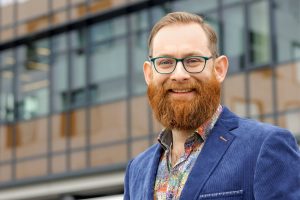[translated from the effzett – the science magazine of Forschungszentrum Jülich – as written by Katja Lüers: https://www.fz-juelich.de/de/aktuelles/portrait-mourik; Image: Forschungszentrum Jülich / Ralf-Uwe Limbach]
 Father of three, quantum physicist, ornithologist and committed open science advocate: Vincent Mourik’s life is colorful.
Father of three, quantum physicist, ornithologist and committed open science advocate: Vincent Mourik’s life is colorful.
Just the other day, Vincent Mourik had another interesting conversation about quantum physics – with a dancer: Admittedly, it was less about the interaction of the smallest particles and more about the abstractness of the concepts: “That’s exactly what connected the artist, who specializes in modern dance, and me, the physicist: the abstractness as a common level,” explains the Dutchman, whom the North Rhine-Westphalian Academy of Sciences and Arts accepted as a fellow in its Young Investigator Program last December. Since the end of 2021, the 36-year-old has been working at the JARA Institute for Quantum Information at Forschungszentrum Jülich, building up a junior research group and his Solid State Quantum Devices Laboratory (SQUAD), which is located on the RWTH Aachen campus.
On this day, however, the man with the distinctive full red beard can be found neither in Jülich nor in Aachen, but in his cottage in the Dutch province of Limburg, where he lives with his wife and three children. A couple of budgies are noisy in the background: “They help against our homesickness,” the researcher says and laughs, because from 2016 to 2021 he did postdoctoral research in Sydney at the University of New South Wales. “There were really a lot of good reasons to return to Germany and Europe, the weather definitely not being one of them. In Australia, we never had to worry about the kids’ clothes,” Mourik reports with a twinkle in his eye.
What he actually sorely misses: nature and the wilderness. “It was only in Australia that I became aware of how much pressure there is on this earth, what role biodiversity plays and how much humans are destroying nature,” says Mourik. It was then that he decided – in addition to his work as a physicist – to collaborate on monitoring studies of birds. Even as a child, Mourik had used every free minute to watch birds, but he still didn’t want to become an ornithologist. “That would have been kind of uncool when he was 18,” says the researcher with a wide range of interests. So he studied physics at Delft University of Technology.
“Even as a student, I was fascinated by how our macroscopic world emerges from a microscopic world, which in turn is described by quantum mechanics,” he raves. The then 19-year-old was fascinated by the contrast in quantum physics between a theory that has the potential to revolutionize our technologies and thus our society, and a practice that is difficult for laypeople to access – a fascination that continues until today.
A matter close to his heart: Open Science
Scientific transparency is close to Vincent Mourik’s heart. With this in mind, he is committed to Open Science and comprehensive data sharing. He advocates open online publishing including open peer review without rejections of submissions. “Publication platforms should be non-profit, commercial scientific journals should be abolished,” Mourik demands.
He is also concerned about how to deal with criticism. “It should be completely normal to discuss scientific problems publicly – for example, if there are inconsistencies in a paper that has already been published,” says Mourik. From his own experience, he knows that someone who voices criticism in such a case is quickly considered a whistleblower in the community. “As a result, young researchers fear for their careers if they point out possible mistakes. That has to change,” says Mourik.
So far, the physicist has mainly used his time in Jülich to set up his laboratory. Here, Mourik wants to realize his “GeBaseQ” (Germanium Based Qubits) project, for which he has raised 4.8 million euros in 2022 through the “Quantum Futur” competition for young researchers, which is organized by the German Federal Ministry of Education and Research. His motivation: “Within three to five years, I want to establish experiments with my group that will help to better understand quantum physics and contribute to being able to build quantum computers.”
Quantum computers are, in a sense, the icing on the cake of quantum physics. The problem: To build a quantum computer that computes things relevant to real-world applications, millions of computational units, or qubits, must be created and controlled. So far, this has not yet been achieved, and it is an open question what types of qubits will prevail. Qubits can be created using superconductors, ion traps or semiconductors, for example.
Mourik is focusing on semiconductors. This material, mostly made of silicon, is already found in the form of microchips in almost every laptop, smartphone or television.
“We want to find out whether a special semiconductor made of a silicon germanium combination is suitable for quantum bits,” explains Mourik. This combination is comparatively little studied in Germany, he says. Mourik wants to close this gap. To do so, he keeps diving deep into his quantum concepts. “And in between, I go out into nature: There I see, smell, taste and hear life; it is tangible – and not abstract.”